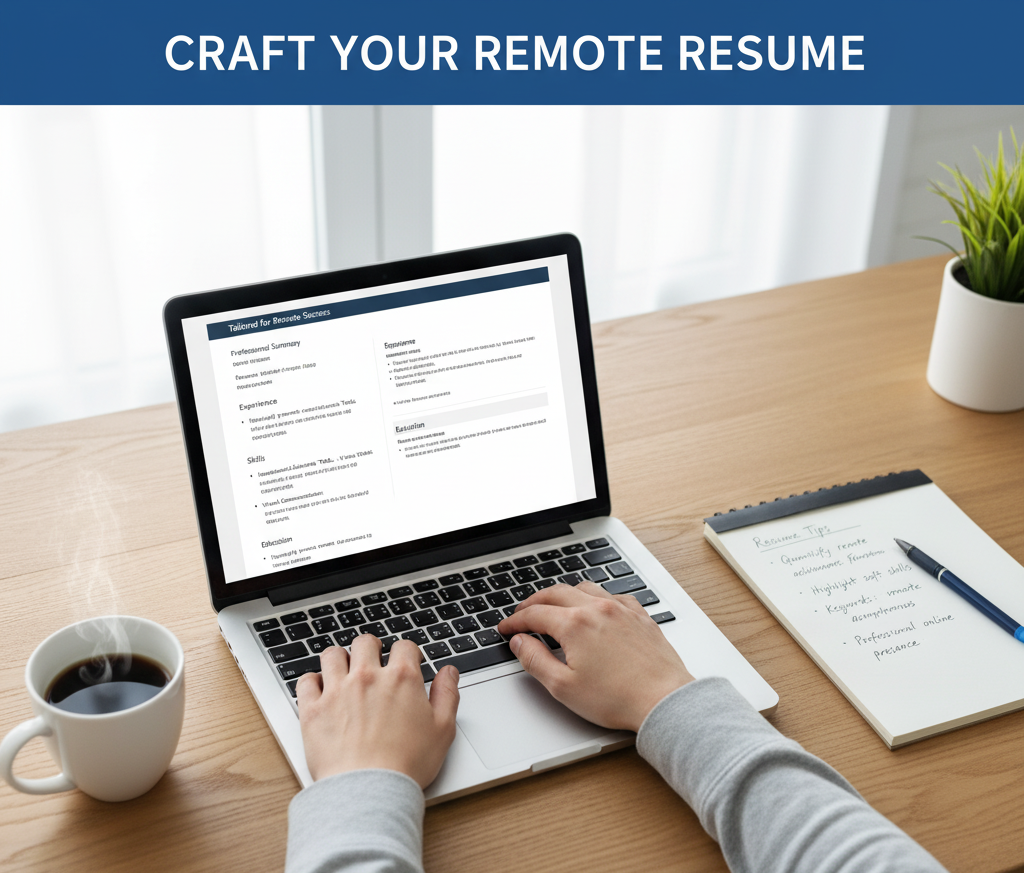Introduction
Landing a work-from-home job is not just about applying to dozens of openings; it’s about making sure your resume speaks directly to the needs of remote employers. Unlike traditional office roles, resume for work from home jobs positions demand a unique mix of skills: independence, digital communication, and the ability to deliver results without direct supervision.
That’s why a resume tailored for remote opportunities looks different from a generic one. It should highlight not only your professional background but also your ability to thrive in virtual environments. Employers often scan resumes quickly, so the way you structure and present your experience can determine whether you get called for an interview or overlooked.
This guide explores how to write a strong, remote-ready resume. From tailoring your skills to formatting for clarity and emphasizing remote-friendly qualities, you’ll learn practical strategies to make your application stand out in the competitive remote job market.
Understanding What Remote Employers Look For
Remote Skills Beyond Job Titles
Traditional resumes often focus on job responsibilities and achievements. But for remote roles, hiring managers look for something more: proof that you can succeed outside a physical office. That means showcasing skills like time management, communication, adaptability, and problem-solving.
For instance, if you worked in a client-facing role, highlight how you managed virtual meetings, used digital tools, or resolved issues without in-person interactions. Remote recruiters want to see evidence that you can handle responsibilities independently while staying connected with team goals.
Why Keywords Matter in Remote Resumes
Most companies now use Applicant Tracking Systems (ATS) to filter resumes. If your resume doesn’t include remote-related keywords such as “virtual collaboration,” “remote project management,” or “digital communication,” it might never reach a human recruiter.
Research job postings before applying and identify common phrases employers use. Incorporating these keywords naturally into your resume increases the chances of passing ATS scans and landing in the recruiter’s shortlist.
Structuring Your Resume for Remote Job Applications
Clear and Concise Formatting
Remote recruiters often receive hundreds of applications, so your resume should be easy to read and well-organized. Keep it to one or two pages, use professional fonts, and break sections into Work Experience, Skills, Education, and Certifications.
Start with a short summary statement resume for work from home jobs at the top. For remote jobs, this should highlight your remote readiness. For example:
“Marketing professional with five years of experience managing digital campaigns, coordinating remote teams, and delivering results in fast-paced virtual environments.”
Highlighting Remote-Friendly Experience
Even if you’ve never worked in a full-time remote role, you likely have relevant experience. Did you collaborate with international clients over email? Manage virtual projects with tools like Trello or Asana? Conduct training through Zoom or Google Meet?
By reframing past experiences, you can show recruiters that you’re comfortable working remotely. Instead of simply stating “Managed marketing campaigns,” write:
“Led digital marketing campaigns with remote cross-functional teams using Slack, Zoom, and Asana for collaboration.”
This shift in phrasing emphasizes your ability to succeed in a remote-first setup.
Showcasing Remote Skills Effectively
Technical Competencies That Stand Out
Remote work is powered by technology. Recruiters want to see whether you can use digital tools to collaborate, stay organized, and deliver results. Create a skills section that lists platforms such as:
- Project management: Asana, Trello, Notion
- Communication: Slack, Zoom, Microsoft Teams
- File management: Google Workspace, Dropbox
This not only highlights your technical readiness but also reassures employers that you can hit the ground running without much training.
Soft Skills That Employers Value
While technical knowledge is important, remote success depends heavily on soft skills. These include self-motivation, time management, adaptability, and clear communication. Instead of just listing them, provide context in your work experience section.
For example:
- “Maintained consistent communication with stakeholders across three time zones, ensuring on-time project delivery.”
- “Demonstrated adaptability by transitioning from in-office to a fully remote role while increasing team productivity by 15%.”
Such descriptions show, rather than simply state, your strengths.
Adding Certifications, Achievements, and Personal Branding
Certifications That Strengthen Remote Resumes
Earning certifications demonstrates initiative and resume for work from home jobs commitment to learning traits that remote employers value. For example, Google Project Management, HubSpot Content Marketing, or CompTIA IT Support can position you as a skilled, remote-ready candidate.
Include a dedicated section for certifications and keep them relevant. This not only strengthens your resume but also signals that you’re prepared for specialized roles in virtual settings.
Showcasing Measurable Achievements
Numbers make your resume more powerful. Remote employers love to see quantifiable results that prove your impact. Instead of vague statements, write:
- “Increased website traffic by 40% through SEO campaigns executed remotely.”
- “Trained 50+ remote employees via virtual workshops, improving onboarding efficiency by 30%.”
These metrics demonstrate that you’re result-driven, a key factor for remote teams where visibility is limited.
Building Personal Branding for Remote Careers
In remote job markets, your online presence often acts as an extension of your resume. Include a link to your LinkedIn profile, digital portfolio, or personal website to showcase your work. A strong personal brand helps employers evaluate your expertise quickly and increases your chances of being shortlisted.

Tailoring Your Resume to Different Remote Roles
Customizing for Industry-Specific Jobs
A one-size-fits-all resume rarely works for remote positions. A remote marketing resume should highlight campaign management, content creation, and analytics, while a remote IT resume should focus on troubleshooting, cloud services, and cybersecurity.
Adjusting your resume to match industry expectations shows attention to detail. Use job postings as a guide to refine your resume for each application.
Freelance vs. Full-Time Remote Resumes
If you’re applying for freelance opportunities, emphasize your project-based achievements and ability to manage multiple clients independently. For full-time remote jobs, highlight your long-term collaboration skills and ability to work within structured teams.
By tailoring your approach, you increase your chances of attracting the right kind of remote opportunity.
Conclusion
A well-written resume can be the deciding factor between landing your dream work-from-home job and being overlooked. Unlike traditional resumes, a remote-focused resume highlights adaptability, resume for work from home jobs communication, and digital competence qualities that employers prioritize in distributed teams.
To stand out, structure your resume for clarity, tailor it with industry-specific keywords, and emphasize both technical and soft skills. Showcase measurable achievements and certifications that prove your readiness for remote environments. Finally, integrate personal branding to enhance your credibility in the digital job market.
Remember, the goal is not just to list your experience but to tell a compelling story of how you can deliver value remotely. With the right strategies, your resume won’t just pass ATS filters; it will capture the attention of hiring managers and unlock career opportunities in the growing remote economy.
Find Your Dream Job Today Explore Endless Career Opportunities and Secure Your Next Role with Best Job Tool



